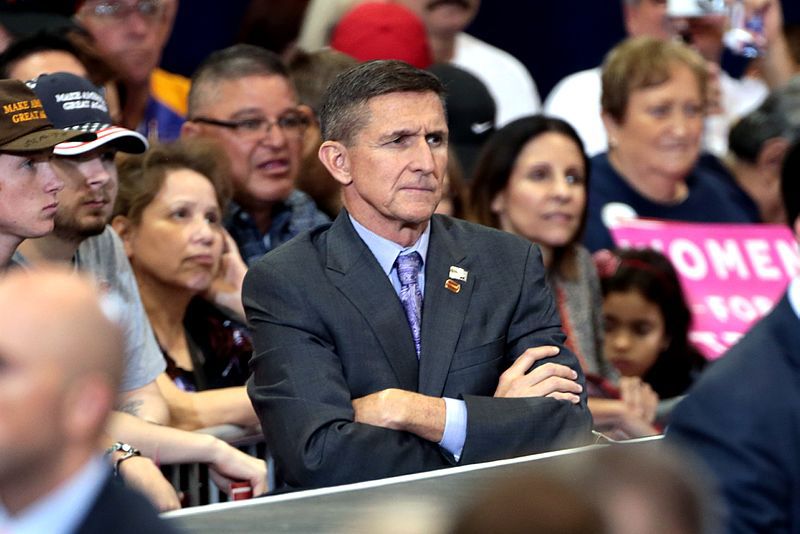Wright: Trump’s unusual Russian media presence
Retired U.S. Army lieutenant general Michael Flynn at a campaign rally for Donald Trump at the Phoenix Convention Center in Phoenix, Arizona.
February 23, 2017
In the United States, one of the most beguiling aspects of our president’s rhetoric has been his positive portrayal of Russian president Vladimir Putin. Originally, this stance shocked both Republicans and Democrats alike, purely for the sake of how unorthodox it was. Narratives quickly developed, accusing the Trump administration of collusion with the Kremlin. Revelations regarding Mike Flynn’s contact with Russian officials have validated some of this but much still remains up in the air.
One thing that hasn’t been questioned as heavily is the Russian media’s treatment of Trump. Nationalist factions of Russia have accused the media of obsession with him as both president and candidate. On average, the U.S. president was mentioned more often than Putin throughout January. No event or person has been mentioned more on average than Putin since 2012.
Now, however, the Kremlin has ordered its media outlets to strongly diminish coverage of President Trump, citing a lack of popularity in coverage of Trump. In reality, Russian viewers prefer seeing coverage of Trump, though much of what they enjoy seeing goes against what the Kremlin would prefer people to see (such as his promises to “drain the swamp” — a concept only contingently used by Russia when it wants to oust a particular oligarch).
This does, however, bring up a point as to how Trump has political value to Russia. Along with saying things the Russian government might find counterproductive, many of the critiques of the Obama administration serve a very different purpose overseas. His critiques of the current state of democracy in the United States, our border security and our economic strength reinforce the Russian’s narrative that the United States is its failing competitor.
This positive portrayal of Russia and worrying view of the United States means that the Russian media has a plethora of soundbites to draw on that advance its agenda. So why the shift? A moderate reduction in airtime for the president wouldn’t be enough to assume anything substantial, but, over the last week, the top two Russian media outlets have gone from mentioning Trump at least 40 times a day to fewer than 10. This is definitely not a small adjustment.
Many are citing a recent tweet by Trump that was, superficially at least, more so directed at former president Obama than Russia, in which he accused the previous administration of not being firm enough and pressuring Russia to give up the Ukrainian territory of Crimea. This statement seems less likely to have occurred before the resignation of Michael Flynn.
No evidence has surfaced to directly suggest that the president has had any undisclosed contact with the Kremlin, but clear and un-refuted evidence has surfaced to say that one of his cabinet members has had contact with Russian officials. Although there hasn’t been anything to suggest that the president played any part in the orchestration of this interaction, the New York Times reported that messages were sent to Flynn laying out how sanctions against Russia could not be lifted without releasing the region of Crimea as an independent state.
These sanctions have crippled the Russian economy, which relies heavily on exporting oil to western nations. At some point, the Russians will need to decide whether to release its hold on Crimea or find a way to survive without exporting oil to western nations. The document left on Flynn’s desk, which has no certain connections to the Kremlin, proposes that Ukraine could lease Crimea to Russia for 50 to 100 years. In return, all sanctions would be lifted on Russian exports.
Trump’s latest statement on Russia’s occupation of Ukraine, however, is a sharp turn from this strategy. It’s possible that this was a plan that people in Trump’s cabinet looked forward to, but now that Flynn’s ties with Russia have gone public, it is not viewed as politically viable. This would explain Flynn’s resignation shortly before accusations of lying to the vice president were announced, and why Trump only suggested such an anti-Russian strategy after members of his administration were investigated for ties with Russia.
It’s also entirely possible that there is no unknown tie between the White House and the Kremlin, and that both Flynn’s connections with the Russian ambassador and the proposed peace agreement between Russia and the Ukraine are entirely isolated incidents. The only evidence of direct contact with any Russian officials says that any interactions ceased months before the president took office.
Nonetheless, the issue with an attempt to vindicate the White House is that it’s known that Flynn discussed Russian sanctions with Pence. While this does show that decisions of the White House were possibly influenced by the Kremlin, no evidence suggests intentional collusion or continued influence.
Yet another possibility is that some form of collusion did take place between the Kremlin and members of the Trump campaign, but interaction ceased months ago. This would explain the symbiotic relationship between two of the most opposing governments in the world, and the sudden break. Whether anyone in the White House knew about Flynn or any other relations with Russia, an (informal) opposition to Russia’s desires could be a signal to the Kremlin they don’t want to play ball anymore, and Russia’s subtle response means that foreign relations are about to become much less predictable.
















